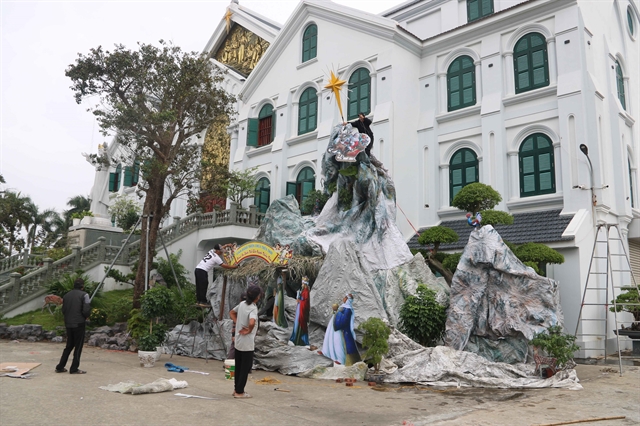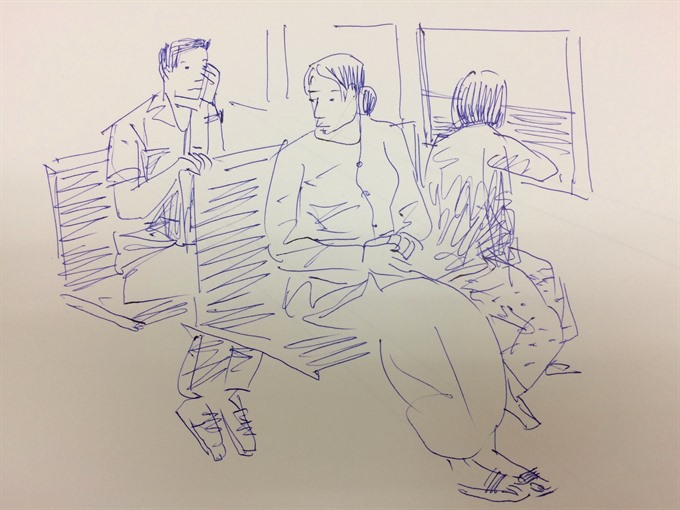

A short story by Hà Phạm Phú
 |
| Illustration by Đào Quốc Huy |
by Hà Phạm Phú
Đan Nam is a river passenger boat that sails from Thượng Đan to Xuyên Nam. When Triệu Tài began working on it as a ticket seller, the boat was decades old.
At that time, a new road had opened to traffic from Thượng Đan through Xuyên Nam to Trại Sắt. Fewer and fewer people were using the boat. The boat company decided that the September service would be the Đan Nam boat’s last voyage, ending half-a-century of operations.
The night before the closing date, Triệu Tài could not get a wink of sleep. He got up and walked to the river landing where the boat was bobbing in the water. He had worked on the boat for five years. Triệu Tài was devastated.
When he was a high school student, he liked literature, but failed the university entrance exam, so went to work on the boat. The vessel had cruised along the river on a timetable, starting on Monday from Thượng Đan and arriving in Xuyên Nam in the afternoon. He stayed overnight there and Tuesday morning, the boat took passengers from Xuyên Nam to Thượng Đan, back and forth for all those years.
After failing the entrance exam, he stayed home and read novels, and Bỉ Vỏ by Nguyên Hồng had the greatest impact on him. Triệu Tai wondered how Nguyen Hồng could write such a great novel when he was only twenty without going to the university. He made up his mind to go and work to earn his living and write.
He was slender compared with the other men working on the boat. But he worked hard. He started work at 4 am to sell tickets. At 5 am the boat left the landing and when it had cruised for about 30 minutes, Triệu Tài began to check the passengers’ tickets. Day in and day out, he got used to working on the boat.
Triệu Tài rented a small room in Thượng Đan town, near to the landing. When the boat got to Xuyên Nam, he stayed with the on-duty man in the boat station. He did not join the other men to drink or gamble. In his knapsack he had some notebooks and an old laptop. Whenever he had some spare time, he took notes or worked on the laptop. Sometimes, he received a little money for his writings published in newspapers at Thượng Đan Post Office. The other boat workers would gently tease him about his literary ambitions.
One Monday morning, when the boat was about to leave, there was a woman leading an 8-year-old girl to the ticket booth. She wanted to go to Xuyên Nam. The woman was about 26 years old with a sad and tired face that caught Triệu Tài’s attention. The girl asked her mother constantly: “Are we in time to meet father, mum?” Triệu Tài guessed they were going to see their patriarch in a prison in Xuyên Nam.
The woman and her daughter took a seat in a quiet corner. It was time for Triệu Tài to check the tickets. He walked along the aisle until he came and checked the tickets of the woman and her daughter. They were about to eat something. He said to the woman that her daughter should have paid half price only.
The boat arrived at the landing at 2 pm. Triệu Tài helped the woman and her daughter get on the landing and called a motorbike taxi to take them to the prison. Late in the afternoon, Triệu Tài started to cook dinner for the man on-duty and himself. At night he started working on his laptop and wrote about the woman who visited her husband in the prison. He wondered if her husband had committed a crime. Early next morning, Triệu Tài recognised the woman and her daughter buying tickets to return to Thượng Đan. When the boat was in the middle of the river, Triệu Tài came to ask the woman if it was her first time visiting her husband. The woman was a bit confused at first and then she asked:
“How did you know?”
“Oh, I just guessed.”
“Yes” – The woman replied in a low voice.
“Dad didn’t remember me!” – The girl said, looking sad.
“Oh, no. Dad missed you very much!” the mother said, smoothing her daughter’s hair.
Three months later, the woman was on the boat again to visit her husband in Xuyên Đam. Triệu Tài sold her a ticket and asked:
“Why haven’t you taken your daughter along this time?”
“She is sick,” the woman said with a smile.
That night, Triệu Tài worked on his laptop, writing more about the woman.
The next morning, the boat was about to leave without the woman. Triệu Tài sat on the tail, looking aimlessly upon the smooth mountain ranges. What had happened to her, he wondered?
One week later, while he was checking the tickets on the boat back to Thượng Đan, Triệu Tài discovered a woman without a ticket. She had covered her face with an old woolen scarf. She seemed sick. He was startled when he recognised her as the woman from the other day.
“Please, give me a break this time. I haven’t got any money,” the woman said.
Triệu Tài kept silent and bought her a ticket with his money. But his act of kindness was discovered and he was punished with work in the deck below. He considered quitting right there and then. While he was walking back to the lodging house, he heard a woman call him. It was the woman he had met on the boat. He stopped and waited. She smiled at him and said:
“I would like to invite you to my house because today is the traditional bánh trôi festival. My name is Mai”
Triệu Tài agreed to go back to her house. The house was simple, but it had a large back garden. Yet, without a man about the house, it was desolate. Mai called her daughter to greet Triệu Tài.
After Mai worshipped her ancestors on the altar as part of the festival, she sat down with Triệu Tài. She began to open up to him.
“My husband is from Hai Phong in the north. He fled down here to hide from the police. I only learned this after marrying him. He came here when he was over thirty and opened a motorbike repair shop in the town. That year, I failed the university entrance exam, so I often went to town to buy newspapers to look for a job. He asked me if I wanted to work in his shop as an accountant. I agreed and we started to fall in love. Before long I was pregnant and my parents had to agree to our wedding and gave us some land on the edge of the village. He soon showed his true colours as rough, uncouth man, but I had to put up with him because of my daughter.
“One day a picture of my husband was published in the local newspaper after he bravely apprehended a thief. Soon after, the police from Hai Phong rushed into my house and arrested him for murder,” Mai said, beginning cry.
Triệu Tài was embarrassed. Then he said:
“Don’t be so downhearted. I’ve just had a look at your garden. It’s fertile and you can grow banana and pomelo trees.”
Two days later, Triệu Tài came to see Mai and helped her plant banana trees around the garden. He said:
“I’ve ordered some pomelo trees, they can grow inside the garden. By the way, why did you stay so long in Xuyên Nam the other day when you didn’t have any money to buy a ticket?”
Mai looked very sad, saying:
“My husband killed a prison inmate and he was sentenced to life imprisonment.”
Five years went by and Triệu Tài worked for the Đan Nam boat until its last day. The garden of banana and pomelo trees was now in full bloom. Triệu Tai’s writing career had not went how he hoped. The river boat was going to come to an end of its service and the Thượng Đan-Xuyên Đam river route was also going to be closed.
On the morning of September 19, the boat gave the last service to a small number of passengers. On that day, the boat landing was deserted. A farewell ceremony was held before the boat made its last journey. Suddenly, a passenger rushed forward to buy a ticket, but the owner of the boat said:
“Today is a special day, so it’s a free travel.”
To Triệu Tài’s surprise, the passenger was Mai who said to him:
“I know today is the last boat journey, so I want to go with you!”
Triệu Tài said nothing. Mai continued:
“I know you’ve worked on this boat for five years,” she said and took out of her chest pocket a piece of paper. It was the ticket he had given her when she could not afford to buy it. “For these five years, I have brought it along with me for good luck and now I want to offer it to you”
Triệu Tài choked up and his words failed him. They parted with each other at the Thượng Đan boat landing. Triệu Tài stood still watching Mai leave, unaware that the courts had agreed for her to divorce her husband.VNS
Translated by Mạnh Chương




